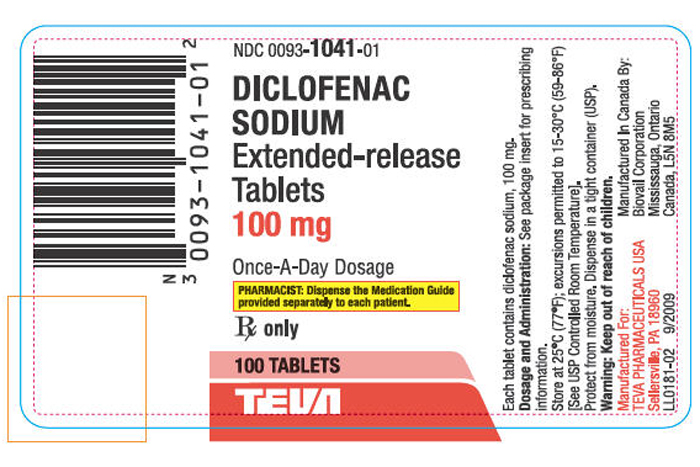Opioids, such as morphine and codeine, have long been used to treat pain and other medical conditions. But they also have a high potential for abuse and dependence. In recent years, researchers have been looking for alternative medications that can provide effective pain relief without the risks associated with opioids. One such medication is diclofenac, a non-steroidal anti-inflammatory drug (NSAID). But is diclofenac an opiate? In this article, we’ll explore the science behind diclofenac and examine the evidence to answer this important question.

What is Diclofenac?
Diclofenac is a non-steroidal anti-inflammatory drug (NSAID) that is used to treat pain, fever and inflammation. It is available both over-the-counter and by prescription. It is also known by its brand name, Voltaren. Diclofenac works by blocking the production of prostaglandins, which are chemicals that are released in the body in response to injury or illness and can cause pain, fever and inflammation.
Uses of Diclofenac
Diclofenac is commonly used to treat pain, inflammation and fever associated with arthritis, menstrual cramps, back pain and other conditions. It can also be used to relieve pain following surgery, tooth extraction or a broken bone. Diclofenac can be taken orally, applied to the skin or given as an injection.
Side Effects of Diclofenac
Like all medications, diclofenac can cause side effects. Common side effects include nausea, diarrhea, stomach pain and headache. Other side effects may include dizziness, drowsiness, constipation, rash and itching. It is important to talk to a doctor before taking diclofenac to ensure that it is safe for the individual.
Is Diclofenac an Opiate?
No, diclofenac is not an opiate. Opiates are a class of drugs that are derived from the opium poppy plant, and they act on the brain and central nervous system to produce a feeling of euphoria. Diclofenac is a non-steroidal anti-inflammatory drug (NSAID) that works by blocking the production of prostaglandins. It does not have any effects on the brain or central nervous system, and therefore it is not an opiate.
Risk of Interactions
Diclofenac can interact with other medications and can be potentially dangerous if not taken as directed. It is important to tell a doctor or pharmacist about all medications being taken in order to avoid any dangerous interactions. It is also important to follow the directions exactly as prescribed.
Overdose
Diclofenac can be dangerous if taken in large doses. Signs of an overdose include dizziness, drowsiness, confusion, sweating, nausea and vomiting. If an overdose is suspected, it is important to seek medical help immediately.
Frequently Asked Questions
Q1. What is Diclofenac?
A1. Diclofenac is a nonsteroidal anti-inflammatory drug (NSAID) commonly used to treat pain, inflammation, and stiffness caused by arthritis, menstrual cramps, and other conditions. It is available as a tablet, capsule, and solution for injection, as well as a topical gel. Diclofenac is also sold under the brand names Voltaren, Cataflam, and Zorvolex.
Q2. Is Diclofenac an Opiate?
A2. No, Diclofenac is not an opiate. Opiates, or opioids, are a type of drug derived from the opium poppy plant. Diclofenac does not fit this classification, as it is an NSAID.
Q3. How Does Diclofenac Work?
A3. Diclofenac works by blocking the action of certain enzymes in the body called cyclooxygenase (COX) enzymes. These enzymes help to produce substances called prostaglandins, which are involved in pain and inflammation. By blocking these enzymes, Diclofenac reduces the production of prostaglandins, which helps to reduce pain and inflammation.
Q4. What are the Side Effects of Diclofenac?
A4. Common side effects of Diclofenac include nausea, vomiting, headache, dizziness, abdominal pain, and diarrhea. Other side effects may include increased risk of heart attack and stroke, increased blood pressure, and kidney damage. It is important to talk to your doctor if you experience any of these side effects.
Q5. Who Should Not Take Diclofenac?
A5. Diclofenac should not be taken by people who are allergic to it, have a history of stomach bleeding or ulcers, have kidney or liver disease, or are taking certain medications such as blood thinners, diuretics, or steroids. Women who are pregnant or breastfeeding should also not take Diclofenac.
Q6. Is Diclofenac Addictive?
A6. No, Diclofenac is not addictive. Diclofenac does not produce the physical and psychological dependence associated with addiction. It is important to use Diclofenac according to the instructions of your doctor and not to exceed the recommended dose.
Diclofenac (Voltaren) – Uses, Dosing, Side Effects
In conclusion, Diclofenac is not an opiate. Although it is a non-steroidal anti-inflammatory drug, it does not have the same effects as opiates. Diclofenac can provide relief from pain, but it is not an addictive substance and will not lead to the same kind of physical or psychological dependence that opiates can. For those looking for an alternative to opiates for pain relief, Diclofenac can be a safe and effective option.
